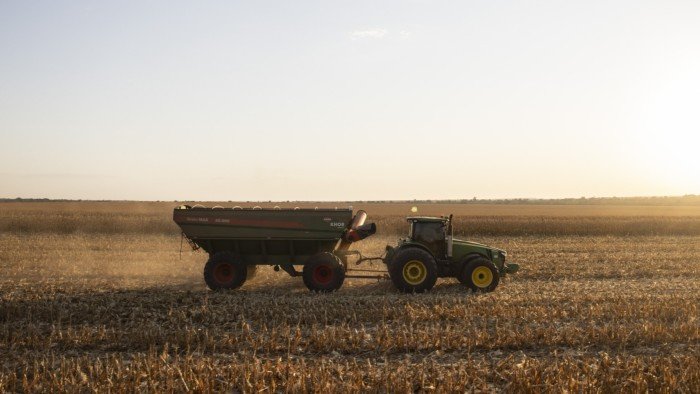Unlock the Editor’s Digest for free
Roula Khalaf, Editor of the FT, selects her favourite stories in this weekly newsletter.
Brazil, the world’s second biggest agricultural exporter, is bracing for additional punitive US tariffs because it has been one of the largest buyers of Russian diesel and fertiliser since the war in Ukraine began, enjoying hundreds of millions of dollars in discounts on its fuel purchases.
President Donald Trump has already imposed 50 per cent duties on most Brazilian goods to press his demands that Brazil halt the trial of his far-right ally Jair Bolsonaro on coup charges and ease off on regulating US social media companies.
But after Trump raised tariffs on India, the biggest market for Russian crude since 2023, and ordered officials to monitor other countries’ purchases of Moscow’s oil products with a view to additional duties, Brazilian politicians and business leaders believe the country could be the next target.
“The latest sanctions on India confirm what could happen to Brazil,” said Carlos Viana, one of a group of Brazilian senators who travelled to Washington last month to discuss trade. “Brazil buys large quantities of diesel [from Russia] and most of the fertilisers used in Brazilian agricultural production.”
Trade between Brazil and Russia, its partner in the Brics bloc of emerging nations, has more than doubled over the past five years, reaching $12.4bn in 2024.
Sérgio Araujo, head of Brazil’s fuel importers’ association Abicom, said there was a threat of more US tariffs. “Russia is an important supplier of a product [diesel] which we are highly dependent on,” he said.
Brazil imports at least a quarter of its diesel, which powers the trucks moving goods around the vast country, as well as tractors and machinery on its farms. The US used to be the main source of diesel imports, but after Russia invaded Ukraine and the EU imposed sanctions, an opportunity opened up to buy diesel more cheaply from Moscow, energy experts said.
Discounts of up to 30 per cent were initially offered to Brazilian buyers by Russia, according to a senior industry source, and they responded eagerly.
Brazil’s diesel imports from Russia shot up from $95mn in 2022, the year the war began, to $4.5bn the following year and $5.4bn last year. This made Brazil the world’s second biggest buyer of Russian diesel after Turkey, oil experts said.
Alan Gelder, vice-president of refining, chemicals and oil markets at Wood Mackenzie, said: “We estimate that the discounted Russian barrels provided Brazil annual savings of over $500mn in 2023 and more than $400mn in 2024. Now Russian diesel imports have become established in Brazil, he added, “the pricing discount has been significantly reduced”.
The discount against US Gulf Coast diesel on a delivered basis peaked at 17 per cent in August 2023, but fell to a monthly average of 1 per cent this year, according to the consultancy.
Brazilian leaders at both ends of the political spectrum have underlined the importance of good relations with Russia. As president, Bolsonaro visited Putin just before the Ukraine invasion to secure fertiliser supplies, while the leftwing incumbent, Luiz Inácio Lula da Silva, was one of the few international leaders attending official celebrations in Moscow this May of the 80th anniversary of Russia’s victory in the second world war.
Brazil’s position with US is further complicated because it is already subject to some of the highest tariffs in the world after Trump’s 50 per cent rate came into effect on Wednesday. Lula has refused so far to speak to the US leader, saying he does not want to suffer “humiliation”. The punitive US tariffs imposed on India do not take effect until August 27, leaving a short time for negotiation.
Ricardo Alban, head of Brazil’s industry lobby CNI, said: “Brazil is already at the epicentre of the tariff rises, so obviously it needs to be worried.” His main concern was fertilisers, a vital input for the country’s agro-industrial exports such as soyabeans, meat, sugar and coffee.
Recommended
Brazil imports about 85 per cent of the fertilisers it needs to grow food and Russia is by far the biggest supplier, supplying $3.5bn of fertilisers in 2023, according to official Brazilian trade data.
Although nitrogen-based fertilisers use natural gas as a feedstock, experts say they are not normally considered petroleum derivatives. However, there are worries that Trump could use a broader definition.
Tomas Pernias, analyst at commodities brokerage StoneX, said Trump’s latest measure “raises concerns that countries highly dependent on Russian fertilisers could potentially be targeted in future executive actions. Brazil, given its strong reliance on Russian supply, is especially exposed.”
While farmers are concerned about nutrients for next year’s crops, fuel importers have a more immediate concern over diesel.
“The worst thing is to imagine that Brazil is going to have to reduce its economic activity for lack of a motor, which is road transport powered by diesel,” said Araujo.
